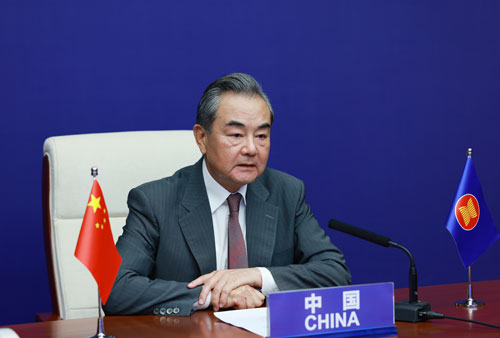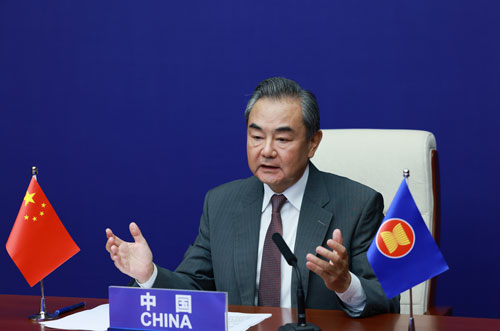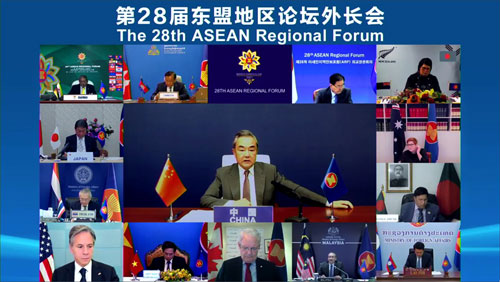| Wang Yi Attends the Foreign Ministers' Meeting of the 28th ASEAN Regional Forum |
| 2021-08-06 18:25 |
|
On the evening of August 6, 2021, State Councilor and Foreign Minister Wang Yi attended the Foreign Ministers' Meeting of the 28th ASEAN Regional Forum (ARF) via video link. Wang Yi said, in face of the pandemic attack and the resurgence of geopolitics, the Chinese side thinks it necessary to practice real multilateralism to maintain regional peace and stability and jointly respond to the five security challenges in the region through enhanced solidarity and cooperation.
First, we need to consolidate the defense against COVID-19 and jointly respond to the challenges brought by the pandemic. The most urgent task is to strengthen vaccine cooperation and protect the life, health and safety of people in the region. China has, to date, provided 460 million doses of COVID-19 vaccines to other Asian countries, including more than 190 million doses to ASEAN countries. President Xi Jinping announced solemnly yesterday that China will strive to provide two billion COVID-19 vaccine doses to the world throughout this year and offer 100 million U.S. dollars to the COVID-19 Vaccine Global Access facility to meet the vaccine needs of developing countries. This is another major move taken by China, and shows our attitude of taking our responsibilities firmly. Resisting political virus should go side by side with the fight against the novel coronavirus. The origin tracing ought to be launched across the board in multiple places across many countries where early infections were detected. The scientific task should not be politicized, a label should not be attached to the virus, and the original tracing should not be utilized as a tool. Second, we need to step up multilateral cooperation and jointly cope with non-traditional security challenges. Efforts should be pooled to tackle such issues as extreme climate, terrorism, transnational crimes, and cybersecurity in the region. China hosted the 19th ARF Inter-Sessional Meeting on Disaster Relief while serving as the co-chair of the Inter-sessional Meeting. China attaches great importance to cybersecurity cooperation and has put forward the Global Initiative on Data Security, which calls for an end to information and communication technology (ICT) activities that steal important data of other States or collect personal information of other States without authorization and to the installation of backdoors in ICT products and services. China also supports the development of a UN convention against cybercrime and looks forward to working with other countries to maintain cybersecurity. The recent changes in the situation in Afghanistan have sharply increased the risk of terrorism in the region, to which all parties should pay great attention and take strong preventive measures. Third, we need to maintain ASEAN centrality and jointly address the challenges of geopolitical confrontation. We should cherish and promote the ASEAN-centered regional cooperation structure, and be vigilant against and prevent certain major powers outside the region from promoting new regional strategies or creating bloc confrontation through military threats. We should work together to ensure that regional cooperation sticks to the healthy and correct direction, takes into account the demands of all parties, accommodates the interests of all parties, promotes common security, and moves toward long-term regional stability. Fourth, we need to defend the principle of non-interference in internal affairs and jointly deal with the challenges of power politics. Non-interference in internal affairs is an important principle of the UN Charter and a basic norm governing international relations. It fully embodies the essence of practicing multilateralism, and what's more important, helps developing countries safeguard their sovereign independence and legitimate rights. All countries are equal and can strengthen exchanges and enhance understanding in the spirit of mutual respect, but they should not impose their likes and dislikes on others, and they should not wantonly meddle in the internal affairs of other countries or even seek their selfish geopolitical agenda under the guise of democracy and human rights. Most countries in East Asia have a common past of being bullied by foreign powers. However, in the present era, there should be no more "lecturers" or "saviors". The destiny of each country should lie in the hands of these countries themselves, and the future of the region should be jointly created by all countries in the region. Fifth, we need to continue the dialogue for peace and jointly tackle the challenges of regional hotspot issues. On the Korean Peninsula, China will continue to support seeking parallel progress in denuclearization and the establishment of a peace mechanism in the Peninsula by taking phased and synchronized actions, so as to realize a political settlement of this issue. On the situation in Myanmar, China supports the ASEAN Special Envoy to Myanmar working in the "ASEAN way" to assist Myanmar in finding a proper solution. The international community should truly respect Myanmar's sovereignty and the choice of its people, do more that can help narrow differences, and refrain from adding fuel to the fire and inappropriate intervention. On the South China Sea, China is willing to reach an effective and substantive Code of Conduct in the South China Sea (COC) that conforms with the international law, including the United Nations Convention on the Law of the Sea, with ASEAN countries, on the basis of the Declaration on the Conduct of Parties in the South China Sea, so as to jointly turn the South China Sea into the sea of peace and cooperation.
ASEAN countries echoed the importance of adhering to the principle of non-interference in internal affairs, especially refraining from using human rights as a political tool to promote double standards. COVID-19 origin tracing should be based on science instead of being subject to political manipulation. The foreign ministers called for maintaining peace and stability in the South China Sea, fully recognized the efforts of China and ASEAN to facilitate consultations on the COC in spite of pandemic disruptions, and believe that countries in the region have the ability and wisdom to properly manage differences through negotiations and achieve harmonious coexistence and common development. The foreign ministers stressed the importance of not engaging in geopolitical confrontation and division, not wanting regional countries to be forced to choose sides and being caught in the middle, and not wanting the region to become a tug-of-war arena for superpower competition. They expect the countries to stay united and work together, focus on the fight against COVID-19 and economic recovery, jointly overcome difficulties and challenges faced in the development and create more welfare for their people. |
| |||||||||||||||
|
|||||||||||||||




